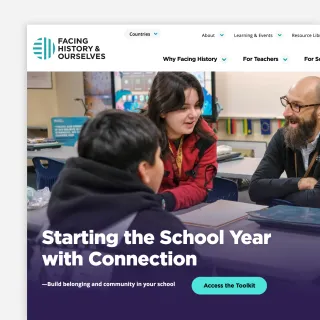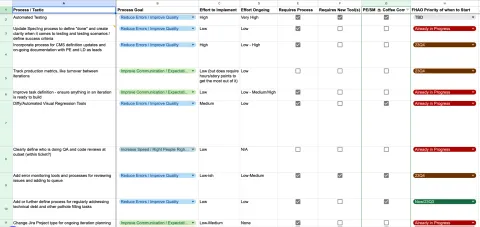
Facing History & Ourselves and Solving the Right Problems
Highlights
-
100+educators, stakeholders, and supporters engaged for user research
-
79%post-launch account signup completion rate
-
79.3%year over year increase in the number of site referrals
Background
Facing History & Ourselves (Facing History) is a national nonprofit organization with a powerful mission - to use “lessons of history to challenge teachers and their students to stand up to bigotry and hate.” They do this through professional learning with educators and curricula designed to “deepen students’ understanding of how their choices and actions can help shape a better, more equitable future.”
The organization's website is a critical tool for disseminating resources for use in the classroom and for professional learning. It also plays a central role in supporting educators as they implement their related lesson plans - allowing them to find and organize resources and materials.
Behind the scenes, their site also requires a complex integration with Salesforce. This integration is designed to create a unified experience for educators, but also a unified picture of the site’s most active users for Facing History staff.
The Challenge
Adding a new external team into the mix quickly and effectively can be a daunting and difficult task. Experienced teams, whether on the organization or partner side, often have different ways of working. If the onboarding is not approached with intention, those differences can lead to friction and less work getting done. These areas of friction can often be exacerbated unintentionally by the (understandable) pressure to get a new team operational as quickly as possible.
The challenge, in a nutshell, is change management, not expertise in development execution.
The Solutions
Listen and Solve the Right Problems…Together
We started by understanding and working within Facing History’s processes as quickly as we could. This is one of the great things about working at an agency - we are exposed to many different modes of working. And if we go into each engagement with an open mind, we are able to learn a lot about what works, what doesn’t, and why. So when Facing History onboarded us into their systems, we knew it was an opportunity to learn.
It also helped us identify some areas where our experiences could help Facing History. So we set up time to talk about how our processes work and differ. And we found that Facing History is also an organization looking for ways to do what they do better.

From there, we jointly built out a “Future State” matrix of possible process improvements optimized for Facing History’s unique needs. We built the matrix around goals to keep the changes focused on solving the right problems. Goals included reducing errors and increasing quality, improving communications and expectation setting, and showing progress and demonstrating value, etc.
Then, together, we implemented the changes at a cadence that worked for everyone. One of the more valuable changes has been a post-sprint retrospective. Retrospectives normalize conversations around the good and the bad of how things are going. As a result, operational issues are more likely to be raised, considered and addressed early and collaboratively.
Commit to Continuous Improvement
Another key element of the transition’s success was team alignment around the concept of strategy-led continuous improvement. Continuous improvement is largely about regularly investing in improving a platform. “Strategy-led” continuous improvement is making sure that continuous improvement is rooted in the core strategic objectives for the site.
This approach to site development can have a big impact on how the work is done because it focuses developers around the outcome of the effort and the “why?” behind the request or requirement, rather than an isolated build spec.
It came together nicely when addressing how search worked on Facing History’s site. User and stakeholder feedback indicated that search - specifically how it prioritized results - was a problem. Rather than focus on boosting specific results or advancing a specific technical solution, Capellic led Facing History through analysis of the current user search experience.
In real-time, we made adjustments to a variety of configurations and approaches that could change the search queries’ results, allowing Facing History to see and evaluate the impact of the changes and adjust accordingly. Facing History could also provide additional context and information behind what they needed to achieve to help our team further refine how we changed search. The result was both a better-performing search and an established methodology for approaching search improvements based on desired outcomes.